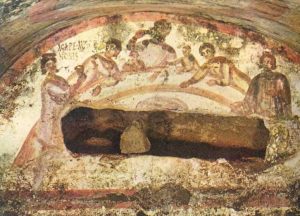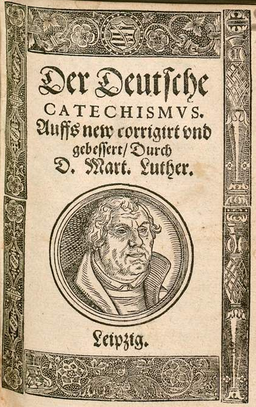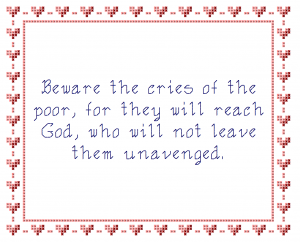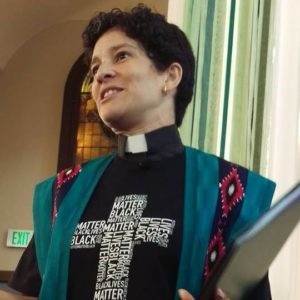Happy 500th Anniversary!
Nearly 500 years ago, the young monk Martin Luther nailed his 95 Theses to a church door in Wittenberg, Germany, and kicked off the movement that would become the Protestant Reformation. The theological disputes that followed have been well-documented over the centuries, but what the Reformation meant for the church’s witness in the midst of hunger and poverty is often forgotten. In this series leading up to October 31, 2017, we have taken a deeper look at the Reformation’s importance for the church’s social ministry – and the important work to which people of faith are called by the gospel.
And now, the full list so far, with links to the previous posts:
10) “I believe that God has made me and all creatures; that He has given me my body and soul, eyes, ears, and all my members, my reason and all my senses, and still takes care of them. He also gives me clothing and shoes, food and drink, house and home, wife and children, land, animals, and all I have. He richly and daily provides me with all that I need to support this body and life.” (Small Catechism)
9) “Christians are to be taught that he who sees a needy man and passes him by, yet gives his money for indulgences, does not buy papal indulgences but God’s wrath.” (95 Theses, #45)
8) “According to this passage [Matthew 25:41-46] we are bound to each other in such a way that no one may forsake the other in his distress but is obliged to assist and help him as he himself would like to be helped.” (“Whether One May Flee a Deadly Plague”)
7) “Let us also be generous [as Abraham was], and let us open the door to poor brethren and receive them with a joyful countenance. If we are deceived now and then, well and good. In spite of this our good will is demonstrated to God, and the kind act…is not lost on Christ, in whose name we are generous. Hence just as we should not intentionally and knowingly support the idleness of slothful people, so, when we have been deceived, we should not give up this eagerness to do good to others.” (Lectures on Genesis)
6) “We should not tolerate but banish [beggars]; not in an unreasonable and tyrannical manner but rather with willing help so that we Christians shall allow no one to come into such poverty and need that he is afflicted and caused to go and cry out after bread.” (Andreas Bodenstein von Karlstadt, “There Should Be No Beggars among Christians”)
5) “We were in need before God and lacked God’s mercy. Hence, as our heavenly Father has in Christ freely come to our aid, we also ought to help our neighbor through our body and its works, and each one should become as it were a Christ to the other…” (Freedom of a Christian)
4) “God says, ‘I do not choose to come to you in my majesty and in the company of angels but in the guise of a poor beggar asking for bread…I want you to know that I am the one who is suffering hunger and thirst.” (Commentary on the Gospel of John)
3) “Many a person thinks he has God and everything he needs when he has money and property; in them he trusts and of them he boasts so stubbornly and securely that he cares for no one. Surely, such a man also has a god – mammon by name, that is money and possessions – on which he fixes his whole heart. It is the most common idol on earth.” (Large Catechism)
2) “But beware how you deal with the poor, of whom there are many now. If, when you meet a poor man who must live from hand to mouth, you act as if everyone must live by your favor…and arrogantly turn him away whom you ought to give aid…he will cry to heaven…Such a man’s sighs and cries will be no joking matter…for they will reach God, who watches over poor, sorrowful hearts, and he will not leave them unavenged.” (Large Catechism)
And, now, for the #1 quote from the Reformation:
1) “For the sacrament [of Holy Communion] has no blessing and significance unless love grows daily and so changes a person that he is made one with all others.”
This touching and poignant quote comes from Luther’s 1519 essay, “The Blessed Sacrament of the Holy and True Body of Christ,” reprinted in Timothy Lull’s superb collection, Martin Luther’s Basic Theological Writings. It highlights Luther’s profound understanding of the sacrament – and discloses the misinterpretations of the sacrament among many communities of faith today.
According to Luther, there are two requirements to take Holy Communion authentically. First, we must have an awareness of our total dependence on God’s grace and the belief that this grace is present in the bread and wine of the meal. Second, we must commit ourselves to sharing the burdens of the other people at the Table with us. Without both of these present, “the sacrament has no blessing and significance.”
What Does This Mean?
In reading this, I am reminded of a lecture I heard many years ago. Gustavo Gutierrez, one of the founders of Latin American liberation theology, spoke to us about Holy Communion. He noted the different ways the Gospel authors describe Jesus’ last supper with his disciples. In Matthew and Luke, Jesus offers the words that would come to form the basis for the sacrament and Words of Institution: “take and eat.” But in the Gospel of John, there is no institution. Instead, as Gutierrez pointed out, Jesus removes his garment and washes the disciples’ feet.
Historical accuracy aside, what Gutierrez was getting at was the link between the sacrament of the meal and the sacramental act of loving service. This is a link Luther, too, makes, though not by comparing the Gospel stories. Instead, Luther sees the sacrament as primarily relational, both vertically and horizontally. Vertically, Holy Communion reminds us of our utter dependence on God and provides for God’s sharing of grace with us. Horizontally, Holy Communion reminds us of the burdens we all share – spiritual, physical, emotional – and the commitment we must make to one another.
The sacrament is something of a conversation, perhaps. God speaks to us the word of grace through the elements; we express our dependence and repentance to God; and we each offer a word of commitment to the neighbor beside us at the Table. It is so much more than merely “God and me,” even though many folks have tried to characterize the sacrament as such.
What misinterpretations miss is the third presence within worship: the neighbor. For Luther, as for many before him, worship is not merely between God and me; the neighbor is a central part of what it means to worship. To worship is to participate in ritual that forms us for service in the world. It is not merely a “break” from everyday life, nor a private service to God. It is a formative event that renews, reconciles, and reinvigorates us to be, as Bishop Elizabeth Eaton has said, “church for the sake of the world.”
This is not all that new, even for the Reformation. As Luther describes earlier in this essay, early Christians understood the “agape meal” (the precursor to Communion) as a key part of their service of one another and the world. At it, members of the community would bring food to share, and those who were hungry or thirsty were filled at the Table. (We see evidence of this in Paul’s second letter to the Corinthians.)

An early Christian fresco of the agape feast, from the Catacombs of Saint Peter and Marcellinus, Rome.
The community gathered at the Table is a witness against all that has crucified Christ and continues to cause suffering today, and it is a testimony to the truth of God’s grace active in the world to end suffering. To take Communion is to become part of a community, to “share the misfortunes of the fellowship,” and to receive the gift of grace that empowers us to participate in God’s transformation of the world. And, again, this isn’t accidental or optional: “the sacrament has no blessing and significance” without this.
So, What?
As we celebrate the 500th anniversary of the Protestant Reformation today, we would do well to remember that this seismic shift was not merely a theological disagreement about Heaven and Hell. It was a fundamental conflict about what the church is called to be. Luther’s great insight – if seemingly simple, if in many ways unoriginal – was that the church is called to be more than a mere institution. It is called to be a living sign of the grace of God in the world. If it is to have power, it must be the power given by God to confront injustice and evil. If it is to be present, it must be present as a refuge for all who suffer. If it is to have authority, it must speak the authoritative word of grace. If it is to be wealthy, it must find its treasures in the richness of reconciled community. If it is to last, it must be worth keeping around.
We’ll end this series with an “honorable mention” quote that comes from none other than former Lutheran Walter Rauschenbusch, the founder of the Social Gospel movement in the early 1900s. In a 1910 letter, he challenged the Lutheran churches in the United States to reclaim their reforming heritage and join the frontlines in the struggle for justice:
Let the Lutheran churches remember their own brave revolutionary beginnings and summon up the daring spirit of the youthful Luther in his noblest days, when he was the voice of his nation and its darling, and embodied in his big, heroic heart all the noblest aspirations after national unity, social justice, moral health, and religious sincerity.
Truly, a challenge that still cries out to us today.
Happy 500th!








 When I first met Patrick Allen, he was sitting in a hotel lobby, quiet and unhappy. He’d come to New Orleans for the 2009 Youth Gathering looking forward to helping with Hurricane Katrina relief efforts.
When I first met Patrick Allen, he was sitting in a hotel lobby, quiet and unhappy. He’d come to New Orleans for the 2009 Youth Gathering looking forward to helping with Hurricane Katrina relief efforts.